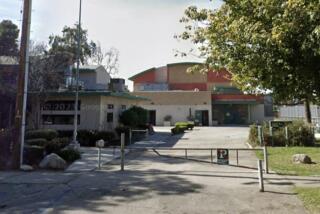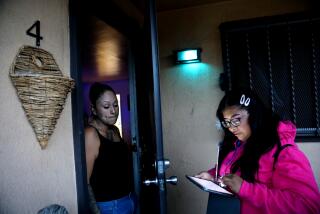Health Stations Help the Homeless
The pain had been gnawing at the pit of his stomach for months, but Carlos Suarez -- homeless, with no money and no health insurance -- didn’t think he was sick enough to see a doctor.
That changed after he was persuaded to sit down at a new, computerized health screening station recently placed at the downtown Los Angeles skid row mission where he has been living.
Blood pressure and other readings measured at the free-standing kiosk indicated serious problems. Through a computer, the 47-year-old former restaurant manager made a clinic appointment on the spot. He ended up having three surgeries, including a gallbladder removal.
“Now I’m having no more pain; I’m gaining weight,” said Saurez, standing before the machine at the Los Angeles Mission that he used during a test run in April. “If I hadn’t sat down here, I’d probably still be waiting to go to the doctor and who knows what might have happened.”
On Thursday, Saurez -- along with providers of services to the homeless and Los Angeles County health officials -- helped officially unveil the screening devices at the mission and five other downtown locations. The stations were designed to aid Los Angeles’s large homeless population.
The health stations are part of a three-year, $975,000 pilot project sponsored by the JWCH Institute, a nonprofit health agency, and funded through a grant by the county’s Office of AIDS Programs and Policy.
Monitors at the sit-down booths can measure blood pressure, weight, heart rate and body mass index and can calculate specific health risks. Via the touch-pad screens, the stations also offer health education videos, information about local health and social service agencies, a drug encyclopedia and charts indicating which medications are incompatible.
An attached phone is linked to referral agencies, where staff members can answer questions and make doctor and counseling appointments. Appointment slips are printed out at the booth.
Lenore Ramoz, 62, uses the health screening station in the lobby of Prototypes, a women’s health and rehabilitative program at 4th and Crocker streets. Concerned about the threat of tuberculosis downtown, she had made a clinic appointment at the booth. She also had used it to measure and control her blood pressure.
“It just blows my mind, how it works,” said Ramoz, who lives in a nearby hotel. “And once you learn how to use it, it’s so easy to teach the next person after you.”
Users like Ramoz can create personal medical profiles that are accessible at each station’s computer. And the machines spit out coupons that can be redeemed for meal tickets, prepaid phone cards, bus tokens and fanny packs, once users complete scheduled clinic appointments.
All of the features are the result of surveys that determined that downtown’s homeless population would use the hi-tech devices, said JWCH Executive Director Phyllis Paxton.
Besides the Los Angeles Mission at 303 E. 5th St., the other screening stations are at the Homeless Outreach Program, 333 S. Central Ave.; the county’s Central Health Department at 241 N. Figueroa St.; Skid Row Housing Trust, 108 E. 5th St., and the Weingart Medical Clinic, 515 E. 6th St.
Tracy Sullivan, director of marketing for Computerized Screening Inc., which manufactured the health stations, said they are the first in the nation with programs designed for homeless people.
“It’s a confidential, non-threatening way people at risk for a lot of diseases can get information they want and be comfortable enough to use it repeatedly,” she said.
County officials hope to use information from the stations to pinpoint specific health needs of homeless people and others living downtown. The central city area of Los Angeles includes about 1.5 million residents, many of whom lack health insurance and suffer inordinately from communicable diseases, said Jaime R. Banuelos, a county public health official.
More to Read
Sign up for Essential California
The most important California stories and recommendations in your inbox every morning.
You may occasionally receive promotional content from the Los Angeles Times.











